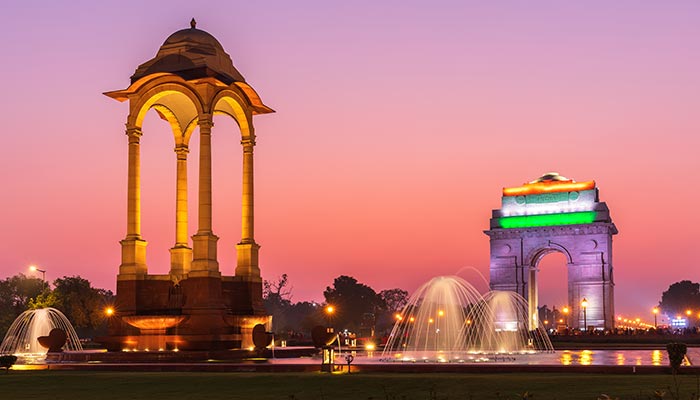Delhi is the heart and capital of the country. Delhi is a bustling metropolis that offers marvellous opportunities for career growth, education, and cultural experiences. Moving to Delhi can be an exciting venture, but planning and managing your finances wisely is essential to ensure a smooth transition.
The piece of information given below aims to provide a comprehensive guide on how to shift to Delhi economically, offering valuable insights and practical tips to help you make informed decisions.
Why should you shift to Delhi?
Shifting to Delhi could be an excellent opportunity for you, whether you are an individual or a family. There are numerous job opportunities in Delhi. Whether you are looking for a high paying or a primary job to compensate for food and shelter, Delhi has everything. Not just jobs, Delhi has also got world-class education, infrastructure, and a standard of living that everyone can afford. The main reasons people shift to Delhi are as follows:
- Numerous job opportunities – The capital has jobs for all. Lakhs of people relocate to Delhi from different corners of the country every year.
- World-class Education – Delhi has a magnificent education system, whether it is primary and secondary education freely available in government schools or higher education is also world – class because of the numerous Delhi University’s (DU).
- Infrastructure – A lot of investment is being made by the government in Delhi to make Delhi more modern and beautiful.
- Standard of living – Delhi is home to various sections of society, and the best thing is that all of them are able to live their life; whether it is the ultra-rich or the lower middle class, everyone is able to survive in Delhi.
How to Save Money while shifting to Delhi

Shifting to Delhi could be a costly affair as it is a very busy city and everything is very expensive. But, by following the below methods, you can save money and shift to Delhi affordably:
Research and Planning
- Understand the Cost of Living: Conduct thorough research to gain insights into the cost of living in Delhi. Consider factors such as accommodation, transportation, food, utilities, and healthcare. Websites and forums dedicated to Delhi’s expat community can be valuable resources in understanding living expenses.
- Budgeting: Prepare a detailed budget that takes into account your monthly income, expenses, and savings goals. Factor in costs such as rent, groceries, transportation, utilities, and entertainment. Having a realistic budget will help you manage your finances effectively.
- Job Market: Explore the job market in Delhi to ensure you have stable employment opportunities. Online job portals, company websites, and networking platforms can assist you in identifying potential employers and job vacancies.
Accommodation
- Renting Options: Delhi offers a variety of accommodation options suitable for different budgets. Consider factors such as location, accessibility, and safety when searching for housing. Websites and mobile applications like MagicBricks, 99acres, and CommonFloor can provide listings of rental properties in various areas of the city.
- Flatmates and Co-living Spaces: Sharing accommodation with flatmates or considering co-living spaces can significantly reduce housing expenses. Explore websites and social media groups specifically designed for finding flatmates to connect with individuals looking for shared housing.
- Negotiation and Research: When finalizing a rental agreement, negotiate the rent and terms to ensure you get the best deal. Be diligent in researching the prevailing rental rates in the area to negotiate effectively.
Transportation
- Public Transport: Delhi has a well-connected public transport system, including the Delhi Metro with route map and metro stations list, buses, and auto-rickshaws. Utilize these options to save on commuting expenses. Consider purchasing a monthly or daily pass for the Delhi Metro, which offers discounted fares.
- Shared Commuting: Carpooling and ride-sharing services like Ola and Uber can help reduce transportation costs. Connect with colleagues or fellow residents in your area to explore carpooling options.
- Cycling and Walking: Delhi has been promoting cycling as a sustainable and economical mode of transport. Consider purchasing a bicycle and exploring areas where cycling is feasible. Walking can also be a convenient option for shorter distances.
Cost-Effective Lifestyle Choices
- Cooking at Home: Eating out regularly can be expensive. Embrace the art of cooking and prepare meals at home. Explore local markets for fresh produce and groceries, which are often cheaper than supermarkets.
- Entertainment and Recreation: Delhi offers numerous affordable entertainment options You can visit public parks, museums, art galleries, and cultural events that often have minimal or no entry fees. Explore free or low-cost recreational activities such as hiking, cycling, and yoga.
- Discount Offers and Loyalty Programs: Keep an eye out for discount offers, coupons, and loyalty programs provided by restaurants, retail stores, and online platforms. Sign up for newsletters and follow social media accounts to stay updated on the latest deals and discounts.
Healthcare and Education
- Government Hospitals and Clinics: Delhi has a well-established network of government hospitals and clinics that provide quality healthcare at lower costs. Research and identify the nearest government healthcare facilities in your area.
- Health Insurance: Invest in a comprehensive health insurance policy that covers medical expenses. Compare different insurance providers and choose a plan that suits your needs and budget. Having insurance can provide financial security in case of any medical emergencies.
- Educational Institutions: If you have children or are planning to pursue further education, research schools and universities offer quality education at reasonable fees. Delhi has a wide range of educational institutions, including government schools and colleges, that provide affordable education.
Money-Saving Tips for Shifting in Delhi

If you have read it till now, then there are bonus tips for you to save some money. Follow these amazing tips to save some extra money while finding the best residential areas to live in Delhi:
Pack the precious goods neatly:
Pack the valuable goods well and use bubble wrap. Initially, it might look like an expense and a waste of time,
but when you are on the road, you will get to know that it is one of the best decisions you take, as roads in Delhi are usually fine, but sometimes there can be potholes on the road which can lead to your valuable stuff getting broken into pieces.
Try to shift on weekdays:
Even though this might not look like a big deal, shifting on weekdays could be a big timesaver for you. In Delhi, packers and movers are usually expensive on weekends because many people tend to shift on weekends. So you can save yourself from the hassle and also save some money.
Energy Conservation:
Adopt energy-saving practices to reduce electricity bills. Use energy-efficient appliances, switch off lights and fans when not in use, and make use of natural light as much as possible. Unplug electronic devices when they are not in use to avoid standby power consumption.
Water Conservation:
Delhi faces water scarcity, so practicing water conservation can help reduce utility bills. Fix leaky faucets and pipes promptly, take shorter showers, and collect rainwater for household purposes.
Second-hand Shopping:
Consider buying second-hand furniture, electronics, and appliances instead of purchasing brand-new items. Platforms like OLX, Quikr, and Facebook Marketplace offer a wide range of pre-owned goods at affordable prices.
Meal Planning and Bulk Buying:
Plan your meals in advance and make a shopping list accordingly. Buying groceries in bulk can help you save Money in the long run. Look for wholesale markets or cooperative stores that offer discounted rates for bulk purchases.
Utilize Free Resources:
Delhi has various libraries, community centers, and public facilities that provide free or low-cost access to books, the internet, and recreational activities. Take advantage of these resources to minimize expenses.
Having a 2-wheeler will be a big game changer:
A two-wheeler, such as a bike or a scooty is one of the best ways to commute to work, shopping, or anywhere as Delhi has intolerable traffic that can be extremely jarring. A 2-wheeler is a great solution to traffic as it takes less space; also, it is way more affordable than a car.
Try to find a house that is near the Metro:
Having your house near the Metro is a great benefit as it is a brilliant landmark. Also, a lot of time will be saved as the Metro is one of the fastest ways to commute in Delhi, and it saves valuable hours of our time.
Label the Boxes:
Labelling the boxes might look like a very basic task, but this is a great time and money-saving technique as most of the time when we shift, we don’t label the boxes, so when we look for something, and we can’t find it, we have no choice but to buy it. So yourself from this mess and label the boxes.
Look for a house near your workplace:
Try to find a house that is near to your workplace because, in Delhi, traffic could be so lethal that it can take hours for a mere kilometer drive. So having your house near your workplace can help you save a lot of time.
Double-check the prices and also bargain:
There will be a lot of expenses in Delhi when you shift, but always remember to double-check the prices as a lot of people aim to scam new residents in the area. Also, try to bargain as well because the shopkeepers usually have a good margin and most of the time when you ask for a discount you usually get it as well.
Downsides of shifting to Delhi

Even though shifting to Delhi might be a good decision financially but there are drawbacks that one should keep in mind when deciding to relocate to Delhi. Below are the major downsides of shifting to Delhi:
Climate:
Delhi’s climate tests people a lot; when there is summer, the heat is intolerable, and when there is winter, the cold is so frightening that there are cases of people freezing to death. Also, the monsoon is unbearable as well. So if previously you have lived in a place where the weather is soothing, then make sure you can stand the heat.
Air Pollution:
Delhi is ranked 4th in the world when it comes to pollution. This statement itself tells the air condition of the capital. So if you have any respiratory issues or diseases, then first live in Delhi for a few days so that you can analyze whether you will be able to manage the pollution before deciding to shift to Delhi.
Traffic Congestion:
Traffic in Delhi can be really irritating. According to a report made by IBM’s global Commuter Pain study in 2013, New Delhi is among the top 10 cities in the world having the worst traffic jams. The daily commuting could be really grueling.
Crime:
Unfortunately, Delhi is also the crime capital of the country. The crime rate in Delhi is extremely high. Safety is everyone’s biggest priority in Delhi. So it is very important to choose a safe locality for accommodation.
Conclusion
Shifting to Delhi economically requires careful planning, research, and adopting smart financial strategies. By understanding the cost of living, finding affordable accommodation, utilizing cost-effective transportation options, making wise lifestyle choices, and accessing affordable healthcare and education, you can manage your finances effectively in the vibrant city of Delhi. Remember to create a realistic budget, prioritize your expenses, and seek out money-saving opportunities. With the right approach, you can enjoy the opportunities and experiences that Delhi offers without straining your finances. Happy shifting!
Frequently Asked Questions (FAQs)
Q1. What can be the average cost of living in Delhi?
The cost of living in Delhi varies depending on factors such as location, lifestyle choices, and accommodation preferences. On average, a single person can expect to spend around INR 20,000 to INR 40,000 per month, including rent, utilities, food, transportation, and entertainment.
Q2. How can I find affordable accommodation in Delhi?
To find affordable accommodation in Delhi, consider websites and mobile applications like MagicBricks, 99acres, and CommonFloor for rental listings. Additionally, explore co-living spaces and consider sharing accommodation with flatmates to reduce housing expenses.
Q3. What are the most cost-effective transportation options in Delhi?
Delhi offers a well-connected public transport system, including the Delhi Metro, buses, and auto-rickshaws. Utilizing these options can help save on transportation costs. Carpooling, cycling, and walking are also viable alternatives for shorter distances.
Q4. Are there any tips for reducing food expenses in Delhi?
To reduce food expenses, consider cooking at home instead of eating out frequently. Explore local markets for fresh produce and groceries, as they are often cheaper than supermarkets. Additionally, look out for discounts and loyalty programs offered by restaurants and online food delivery platforms.
Q5. How can I access affordable healthcare in Delhi?
Delhi has a network of government hospitals and clinics that provide quality healthcare at lower costs. Research and identify the nearest government healthcare facilities in your area. It is also recommended to invest in a comprehensive health insurance policy to cover medical expenses.
Q6. Are there any affordable education options in Delhi?
Delhi has a wide range of educational institutions, including government schools and colleges, that offer affordable education. Research and identify schools and universities that provide quality education at reasonable fees.
Q7. How can I save on transportation costs in Delhi?
Consider using public transportation options such as the Delhi Metro and buses, as they are relatively cheaper than private vehicles. Carpooling with colleagues or using ride-sharing services can also help reduce transportation expenses.
Q8. What are some money-saving tips for living in Delhi?
Some money-saving tips include planning meals, buying groceries in bulk, utilizing free resources like libraries and community centers, and considering second-hand shopping for furniture and appliances. Additionally, staying updated on discounts and deals can help save money on various expenses.
- How to decorate the Kitchen at home? - September 11, 2023
- How to decorate Temple for Shree Krishna Janmashtami? - September 4, 2023
- How to prevent your belongings from getting lost in your home? - August 25, 2023

